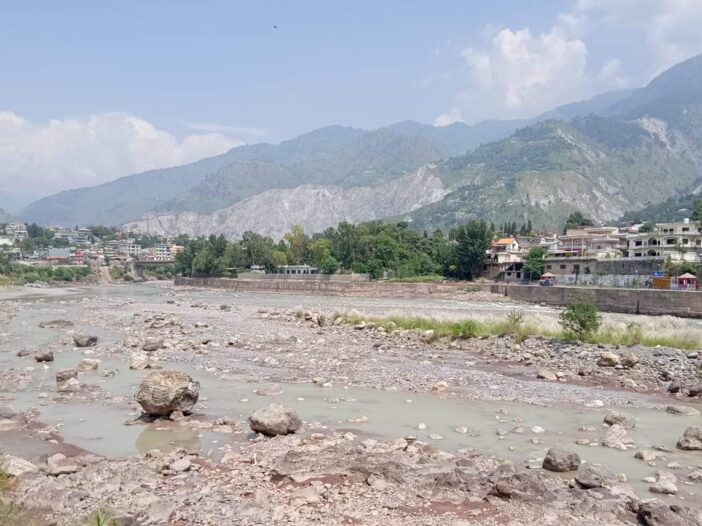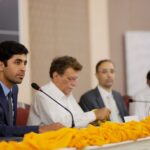
Save River, Save Muzaffarabad
“Have you considered: if your water was to become sunken [into the earth], then who could bring you flowing water?” (Qur’an 67:30).
The Qur’an and Sunnah teach us that as vicegerents (Khalifa) of the earth, human beings have been entrusted with certain responsibilities regarding the maintenance and care of a particular balance: a balance between living beings and the natural world that has been carefully constructed by a benevolent creator. This particular designation doesn’t exist in isolation: it forms part of a larger covenant, informed by the Qur’an and the prophetic tradition, to guide the actions of human life on earth; in regards to our own bodies, our relationships with others in society, and our relationship with the world around us.
Introduction
The Sharia’h embodies a consequentialist framework of jurisprudence set forth by the creator: it is not simply concerned with the immediate; with human interactions on a purely material level, or with micro-level ideas of morality based simply upon the individual, or on property norms. Adherence to the Sharia’h is designed to precede a larger picture of a healthy, harmonious and spiritual society. Furthermore, its adherents are encouraged to think not only of immediate, material gains arising from their actions, but of the consequences their actions will have in the Hereafter.
The dichotomy between this Islamic approach to human consequence, and the common tunnel-visioned approach towards immediate gain, is perhaps most apparent when we consider human impact on the environment. Much discourse surrounding environmental issues today revolves around the effects of man-made damages to the planet, often due to short-sighted profit motive.
Background and Key Facts
To explore this matter further, let us look to the example of the Neelum Jhelum Hydro Power Project (NJHEP) in Muzaffarabad.
Muzaffarabad is the capital city of Azad Jammu & Kashmir, a self-governing region administered by Pakistan. The city sits near the confluence of two rivers, Neelum and Jhelum,whose conflux makes it an opportune point for the Pakistani Government to have implemented the hydropower project.
The Hydropower project has seen the divergence of allegedly 90% of the Neelum river’s water away from its natural route (Tribune, 2018), towards a power station under the Jhelum river. This has resulted in water scarcity in the affected regions downstreamof the divergence, in addition to increased pollution, and a risk of pestilence and illness in the affected regions.
- Water & Power Development Authority (WAPDA), is a government-owned public utility maintaining power and water in Pakistan including Gilgit Baltistan and Azad Jammu & Kashmir.
- The WAPDA has previously constructed various hydro projects in Azad Jammu & Kashmir including the construction of Mangla Dam in Mirpur District having a capacity of 1200 MW which continues to transmit the electricity to the National Grid of Pakistan without paying substantial royalty to the Government of Azad Jammu & Kashmir.
- Government of Pakistan through its outlet, WAPDA initiated NJHEP without obtaining a No Objection Certification (NOC) from the Azad Jammu & Kashmir Environmental Protection Council. A restorative NOC was acquired later on including some crucial conditions on WAPDA. NJHEP has been completed having a capacity of 969 MW
- WAPDA has imitated another project titled Kohala Project with the capacity of 1224 MW which is in the planning to execution phase.
- A study was carried out in mid 90s by a Norwegian company recommending 20 cumecs water would be required to meet the water requirements and ecological system. This recommendation was rejected by WAPDA on the ground of potential economic loss.
- Ironically NJHEP is up and running but WAPDA failed to implement the conditionalities imposed by the Azad Jammu & Kashmir Environmental Projection Agency, which were included in NOC.
- WAPDA has violated the International Law by commissioning such a mega project in a disputed territory.
- WAPDA completed NJHEP without having any formal agreement with the Government of Azad Jammu & Kashmir, while still using the natural resources of Azad Jammu & Kashmir
- Almost population spread at 41 kilometers from Noseri to Domail has been deprived from a natural resource without their will or permission.
- NJHEP has cased issues including ecological, temperature raise, shortage of clean drinking water, adverse impact on health and agriculture.
- Further details can be found in a Writ Petition submitted to the High Court of Azad Jammu & Kashmir by the civil society.
Muzaffarabad’s recent history (the city was at the center of a Magnitude 7.6 earthquake in 2005) has been one of devastation and recovery. It is estimated that around 70% of the earthquake’s 87,000 Pakistani casualties were in Muzaffarabad. One survey protesting the hydropower project has lamented that the same region that suffered natural disaster is now being subjected to “man-made calamity” (iPetitions, 2018).
We hold that the underlying idea behind the project – harnessing the natural resources of the river in order to generate power for citizens, and tackling the power shortage – is not problematic in and of itself. Indeed, the use of hydropower for energy generation, as opposed to nuclear energy or fossil fuels, is in theory very Sharia’h compliant – using that which Allah (swt) has made available to us for the benefit of society.
Caliph Ali Ibn Ali Talib once said: “Partake of it gladly so long as you are benefactor, not despoiler; cultivator, not destroyer.” Let us think of these words as we consider the problems with the ways the Neelum Jhelum Hydropower Project has been implemented.
Problems
- The WAPDA (Water and Power Development Authority) said beforehand that only 20% of water would be diverted. It is claimed to be closer to 90% (pakistantoday.com.pk, 2018).
- Changes to the natural ecosystem run the risk of breeding pestilence and airborne disease.
- WAPDA committed Court of Contempt by not obeying the orders of the High Court of Azad Jammu & Kashmir
- WAPDA did not follow the conditions which were part of the NOC such as;
- Construction of sewerage treatment plants
- Plantation
- Greater water supply scheme
- Creating small lakes in the affected areas etc.
There is also a further political element to the issue, due to the Pakistan government’s role in administering the water management, superseding the government of Azad Jammu & Kashmir; and the fact that the Kashmiri residents are not even benefitting from the energy generated.
Civil Society Movement — Save the River, Save Muzaffarabad
What role can civil society play in addressing the issue facing the affected citizens? According to Michael Edwards, ‘networks of intermediary associations’ between the state and its its citizens can:
- Act as counterweights to vested interests
- Promote accountability in states and markets
- Build new and more inclusive institutions
- Channel information to decision makers on what is happening at the ‘sharp end’
- Negotiate the social contracts between government and citizens
(Edwards, 2014)
A growing civil society movement: “Save the River, Save Muzaffarabad’ has emerged to protest, fight and appeal the actions of the WAPDA and its implementation of the hydropower project. The movement instigated a strike in January 2019 that was observed by a broad coalition of civil society activists from across the various sectors of commercial and public society. Led in part by the community of lawyers in Muzaffarabad district, the strike also involved students, political workers, and many of the traders and merchants in the region. It has been reported that the city’s market stalls, shops and bazaars remained closed for the duration of the strike (Naqash, 2019).
The movement has been active on social media, with Youtube videos showing the before-and-after effects on the river’s water levels, (Ali, 2018) in addition to Facebook groups spreading public awareness and updates of committee activity and progress (Facebook, 2019). We should be careful of the politicisation of the situation by certain sources: many online reports have come from Indian sources, eager to exploit the increased discord between Islamabad and the citizens of Azad Jammu & Kashmir (Firstpost.com, 2018) (Deccanchronicle.com, 2018). The movement has also seen a number of protests in the Pakistani capital, in Muzaffarabad and also at the Pakistan Embassy in London.
Similar civil society movements have been commonplace globally with regards to interference in river flow by states and corporations. Recently in Chile, where numerous hydroelectric dams have displaced indigenous peoples, disrupted natural habitats and flooded natural landscapes, the Chilean Free-Flowing Rivers Network has called for legal rights to be applied to rivers the way they might be applied to a person. They argue that the Western approach to rivers, treating them only as private property, has justified such destruction without consideration for consequence (Benohr & Lynch, 2018).
In 2017, the New Zealand government granted legal personhood to the Whanganui River. That same year, Indian courts did the same for the Ganges River in efforts to curb pollution, although the decision was later overturned (Safi, 2017). In the particular cases mentioned above, the river as an entity has a level of spiritual value for particular stakeholders (native Chilean tribes, Hindus and Maoris respectively) and the movements have sought to draft legislation based on these cultural perceptions: “In figuring out how countries can reverse this environmental degradation and reduce conflicts, a lot can be learned from the indigenous view of rivers. Legal innovations that successfully incorporate this outlook could better protect rivers.”
A move to grant ‘personhood’ to a river is less appropriate in Pakistan; but it nonetheless opens up conversation about the potential for using religious values in environment legislation, as “the traditional Western view of rivers – and of nature generally – has failed us.”

Malik Wasim
What Role Should the Sharia’h Play in Influencing this Movement?
The Sharia’h is a clear path to water; a passage to be followed, like the natural course of a flowing river. The problem that has arisen for the citizens of Muzaffarabad District is directly due to the failure of those holding the privilege of power to adhere to the guidance set forth by the creator. They have pursued immediate gain without consideration for consequence, in this world or the next.
Water is mentioned 63 times in the Qur’an and is consistently referred to in passages that discourage reckless consumption, encourage gratitude for the bountiful gifts of the creator, and highlight the shared custodianship of the world’s natural resources. We are reminded that water is sustaining and all-encompassing, essential for the nourishment of all life on earth and the balance of our natural ecosystem. It is also needed for performing Wudu, a consistent necessity for performing the five daily prayers. Prophet Muhammad (pbuh) emphasised the importance of conservation and refraining from excessive wastefulness by declaring that something as sacred as Wudu should be done without excess even if a whole river is available.
The Quran passage “And We have sent down rain from the sky in a measured amount and settled it into the earth. And indeed, We are Able to take it away.” (Surah 23 (al-Mu’minun) Verse 18) reminds us God has given us a non-endless supply of water that requires proper water management, and his mercy and bounty come with adequate responsibilities on the part of humankind.
The prophet Muhammad (saw) was reported to have said “Muslims have common share in three things: grass, water and fire.” This highlights that water is for the benefit of all and that water management policy should reflect this; particularly that of an Islamic government. When we consider the diversion of the Neelum River, it is not just that the government have failed to adequately distribute that which should be shared; worse, they have taken away that which was naturally distributed across the region by the Creator Himself.
However, these considerations have not been extensively considered by the movement. The Islamic teachings on the sanctity of sharing water, and the prominence of long-term considerations of public good, framed for both now and in the Hereafter, have not been adequately used as a tool by the movement. Personal correspondence with activists has revealed that the rhetoric of Western environmental concerns has been the primary tool.
A Sharia’h-extensive platform on the issue, in the movement’s language, its media, its literature, its leadership and its demands, could serve to put additional pressure on the authorities, by framing them and their actions as ungodly and inhumane; while framing the Save The River Movement as a force for good that stretches beyond the Neelum Valley.
Conclusion
The movement to protect the river and maintain its nourishment to inhabitants of the affected region is gaining traction, and is instigating large protests even this week. The outcomes of such protests are yet to be seen; but it is important for us to reflect on the significance and necessity of such endeavors.
While civil society movements should not be without scrutiny, they serve an integral position alongside the private and government sectors. Their importance is realised when they fill gaps that governments have failed to fill, but is perhaps never more apparent than when they serve in opposition to government overreach or corruption.
We have seen the ways, in Chile, India and New Zealand, that the spiritual values of the communities with the largest stakes in rivers have directly contributed to environmental legislation regarding river governance. In the Azad Jammu & Kashmir example, there has so far been minimal effort to appropriate Islamic principles in the plight of the villagers. This feels like a missed opportunity, given the extent of the argument that the actions of the WAPDA go against the teachings of Islam, and the movement’s grassroots connection to the communities that depend upon the river.
I would recommend that the movement re-evaluates their rhetoric and strategy in a manner that puts the religious concerns as central, perhaps in a way that serves to reinforce the political angle. The central issue surrounds communities whose livelihoods are being affected by the actions of a distant government; with natural resources being exploited in a manner that do not benefit the locals. This is un-Islamic in essence. The political and religious concerns regarding the Hydropower project are thus in alignment.
References
Ali, H. (2018, October 03). Save River, Save Muzaffarabad. Retrieved from YouTube: https://www.youtube.com/watch?v=7xx35LKdLEc&fbclid=IwAR36uzuEVLAr668C75IX2y8dKoxjGgOVLUXhkymjhQ57leclNrSW90rhXpQ
Benohr, J., & Lynch, P. J. (2018, August 14). Should Rivers Have Rights? A Growing Movement Says It’s About Time. Retrieved from Yale Environment 360: https://e360.yale.edu/features/should-rivers-have-rights-a-growing-movement-says-its-about-time
Deccanchronicle.com. (2018, August 12). Pak declares ‘water war’ on people of PoK by diverting waters of Neelum river . Retrieved from Deccan Chronicle: https://www.deccanchronicle.com/world/asia/120818/pak-declares-water-war-on-pok-people-by-diverting-neelum-river-water.html
Edwards, M. (2014). Civil Society (Third Edition). Cambridge: Polity Press.
Facebook. (2019, March 26). Save River Save Muzaffarabad. Retrieved from Facebook: https://www.facebook.com/groups/1276432025829252/
Firstpost.com. (2018, September 11). Protests erupt in Pakistan-occupied Kashmir against diversion of Neelam river to Punjab province. Retrieved from Firstpost.com: https://www.firstpost.com/world/protests-erupt-in-pakistan-occupied-kashmir-against-diversion-of-neelam-river-to-punjab-province-5159001.html
iPetitions. (2018). Save The River – Save Muzaffarabad. Retrieved from I-Petitions: https://www.ipetitions.com/petition/save-the-river-save-muzaffarabad?fbclid=IwAR2rLioH7s5GXPq1Kd_MaFhGZhAm0aJKybq6hdLc_5Kr7js1ny8xitiimMo
Naqash, T. (2019, January 11). Muzaffarabad observes shutter down against diversion of Neelum River . Retrieved from Dawn: https://www.dawn.com/news/1456734
pakistantoday.com.pk. (2018, September 17). Protesters claim Muzaffarabad water shortage caused by hydro-power power project. Retrieved from Pakistan Today: https://www.pakistantoday.com.pk/2018/09/17/protesters-claim-muzaffarabad-water-shortage-caused-by-hydro-power-power-project/
Safi, M. (2017, March 21). Ganges and Yamuna rivers granted same legal rights as human beings. Retrieved from The Guardian: https://www.theguardian.com/world/2017/mar/21/ganges-and-yamuna-rivers-granted-same-legal-rights-as-human-beings
thekashmirimages.com. (2019, January 12). Save the River Movement; shutdown observed in Muzaffarabad. Retrieved from The Kashmir Images: https://thekashmirimages.com/2019/01/12/save-the-river-movement-shutdown-observed-in-muzaffarabad/?fbclid=IwAR0il4dGgPZS90g6vPBRgy0CUuQcql7TbKsVe-OBKzaljenU0qUb66lxRJ0
Tribune. (2018, September 17). Hydropower project cuts Muzaffarabad water. Retrieved from The Express Tribune: https://tribune.com.pk/story/1804976/1-hydropower-project-cuts-muzaffarabad-water/
Author: Malik Wasim | Humanitarian and Social Activist





Leave a Reply